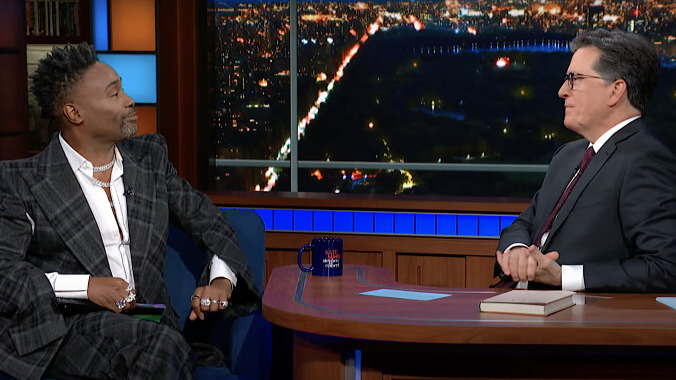Billy Porter apologizes for dragging Harry Styles, but tells Stephen Colbert representation matters
In his new memoir, Porter details how identity isn't just fashion, but life and death

In the future EGOT sweepstakes, few are better positioned than Emmy, Tony, and Grammy winner Billy Porter. Appearing on Thursday’s Late Show, the Pose and Cinderella star, in discussing his career as outlined in his new memoir, Unprotected, told Stephen Colbert that his COVID downtime has proven surprisingly restorative when it comes to looking back at his various successes. “Shame is a silencer, and silence is a murderer,” Porter told Colbert, in a bit of Yoda-like wisdom concerning his decision to tell all about his long and difficult trek to where he sits, perched on the top of the acting, fashion, and now literary world. (Colbert showed of the custom-made Jimmy Choo/Billy Porter tan, zebra-striped loafers Porter sent him.) Explaining that all this enforced COVID idleness has allowed him to finally delve into some buried past traumas, Porter told Colbert that, paradoxically, it took a global pandemic to give him the space to find some inner peace. “I’m feeling real joy for the first time in my life,” said Porter.
And why not? For one thing, Porter actually did write a best-seller during quarantine, which is what plenty of us told ourselves we were going to do. For another, the 52-year-old actor has emerged from a lifetime of struggle as not only a respected actor, but an icon both in the fashion world and in the fight for LGBTQ rights and identity. That latter position recently found Porter in a position to, say, criticize a major magazine for making cis-gendered white guy Harry Styles the first man to get a Vogue cover while wearing a dress. As Porter explained to Colbert when asked about the resulting controversy, it was “a slow news day” that turned his rightfully complex comments concerning cultural appropriation into nothing but a celebrity feud. “Apparently, I’m famous now,” joked Porter, before apologizing to the British pop star, at least for how the press inevitably made the story about Styles, and not the real issues at hand.
“Harry Styles, I want to apologize for having your name in my mouth,” said Porter, addressing the camera (and, presumably, Styles) directly. “It’s not about you. The conversation is not about you.” What that conversation is about, Porter stressed, is “the systems of oppression and erasure of people of color who contribute to the culture.” With customary élan, Porter elaborated that he’s more than willing to have the actual conversation “sans the dragging and the cancel culture of the internet,” since, as he put it definitively, “I do not now, nor do I ever, adjudicate my life—or humanity—though sound bites on social media.” Concluding with a flourish of the rainbow fan he’d brought along to top off his evening’s ensemble (sort of a flowing, checked-charcoal business suit with vented underarms), Porter stated, “So, when you’re ready to have the real conversation, call a bitch!”
Continuing the themes of truth-telling and unflinching honesty, Porter told Colbert that Unprotected allowed him the long-overdue opportunity to turn that spotlight inward. Calling the process of writing the memoir, “healing my trauma through the power of art,” Porter confessed that his entire life has been lived in defiance of others’ prejudices and expectations of him as a Black gay man. “I was told that my queerness would be my liability,” Porter told Colbert, adding, “and it was, for decades. And then Kinky Boots happened, and it wasn’t.” Of that Broadway role (which netted him the Tony of his inevitable EGOT), Porter said that being up front about his life (including his 2007 HIV diagnosis), and embracing his authentic self via his performances and now his memoir, “is the only option one has for survival on this planet.” And while Colbert lamented that he’d apparently never have the opportunity to vote for political candidate Billy Porter, Porter soothed the host by reminding him, “I cuss too much.” Honestly, Billy, that’s ceased to be an issue at this point.